#of disability and its hard not to fall into the mindset that no matter where i end up i'll always be treated less than and that i can't eve
Note
been trying to conjure the words for a while, but as someone who’s got family who’s also going through some really tough shit involving mental health work, i just wanna say i’m so sorry you lost your job—but you won’t ever have to work with these people again, at least!
definitely look into legal routes, don’t be afraid to ask for support, and don’t give up. and be sure to rest and recuperate, etc. ableism is insidious as fuck, but you can rise above the lows it throws your way!
(hopefully that all was worded somewhat gracefully. i just am so sorry you’re experiencing this shit, man. but you’ll make it out alive! ❤️)
You don't have to worry about wording things gracefully hon. I know you mean well and didn't see anything here that was warranted as an offense.
Thank you for the condolences. This is one thing I'm hanging onto, that I don't have to work with these people ever again.
I will do everything within my skillset and empathy to never dehumanize or treat anybody the way I was treated as a mental health provider. I'd like to think I do a good job of that already, creating a brave space for people, and this experience nailed it in that I won't allow myself to stoop to this level of being insidious as fuck to a human being.
I don't know the full context of what your family member is going through, but hearing that, I hope they get through the ordeal especially if they are dealing with folks who do not have their best interests in mind.
Thank you again for the condolences and for checking in 💙🫂

#still taking things a day at a time#ive had some other anons asking about donations and such#still working on the master post and i am struggling a bit when it comes to asking for help#im working through it and trying not to let this experience taint my trust that i have in people in general#its a very hard obstacle to get through#trust was one of the biggest obstacles i had when i underwent therapy cause years of abuse since childhood makes it difficult to form#connections without fear second guessing or assuming ill intention on the other persons part#this is the third or fourth job now where i've been thrown under a bus by people that claimed to have my back and valued my skills regardle#of disability and its hard not to fall into the mindset that no matter where i end up i'll always be treated less than and that i can't eve#give people an inch or they'll end up throwing me to the wolves#apologies for the mini rant trying to give more context to the situation especially for folks that don't know wtf is going on#hope you're well and thanks for checking in again hon
2 notes
·
View notes
Text
igained a lot of weight i guess and i tryifn not to feel guilth about it and its at a point where its sad bexauze im not eeven worried for my own health for myseld im just guilty becausw i know if i die it will be my fault because i donr try hard enough and because i donr wanr to fall into a really bad mindset trying to diet because rhat happens all fhe time but i feel like ithink if i die because of my weight i think thats fine becauze people die everyday of pther things but if someone dies while overweight they are a bad person and ir just doesnr even like matter ifs nobodys business idonr even care but i wish i wasnr so disabled and mentally ill where i cant go outside and do things whatever
3 notes
·
View notes
Text
RWBY Recaps: Volume 6 “Stealing from the Elderly”

Here’s the dilemma:
I adore a lighthearted RWBY.
I don’t adore RWBY when the parts RT chooses to frame as jokes are the legitimate flaws the group needs to work through, thereby sending the message that they aren’t flaws at all. No need to take dangerous mindsets seriously!
And that’s this entire episode. Let’s dive in.

We open on a shot of the Atlesian airships stationed in the Argus bay, cuing the viewer into the one thing I really hoped wouldn’t happen in this episode: the gang going through with this ridiculous plan. Because as we quickly see logic needs to do exactly what I said it would, getting the hell out of the characters’ way in order to justify them making it this far. Every choice they make over the next 13 minutes only works because of the Power of Plot and yep, I’m just salty enough to point out as many inconstancies as I can.
Let’s start with Weiss pretending that she’s “come to [her] senses” and is willing to go home. (Oh look! The kids are telling more lies.) This part is, in my opinion, the most solid portion of the plan. As a Schnee, Weiss does have a guaranteed way of getting access to an airship and the biggest risk is that she’ll actually end up going to Atlas by herself, ending up in the hands of her family. In which case Weiss is strong enough and done enough to just leave again. They physically can’t stop her. I would have actually given her the relic with the hope that, worst case scenario, they still complete their task: getting the relic behind safer walls. Right now emotion is warring with pragmatism. Emotionally Ruby isn’t willing to separate from Weiss and have her brave Atlas alone, but logically the best option is to let Weiss complete their mission—just have her run/sneak away once the airship lands?—and leave the rest of the group to figure out how to get to Atlas at their leisure. As in so many other ways, they’re not thinking as huntsmen right now. They’re not putting their jobs above their personal desires.
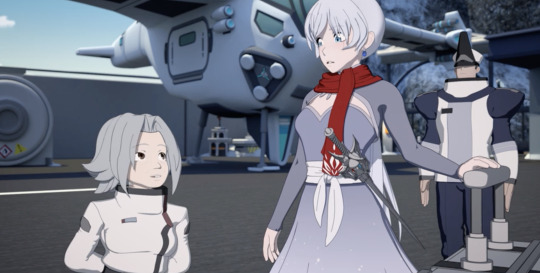
Still, that tiny portion of the plan is pretty solid. The problem is… everything else.
Cordovin makes Weiss uncomfortable by saying that she hopes she follows in Winter’s footsteps and she’ll be sending two of her best guards on the journey with her—so be sure to tell General Ironwood that! Cordovin is clearly concerned only with making herself look good. She leaves Weiss in the ‘capable’ hands of Tweedledee and Tweedledum.
As she’s walking away though things start getting ridiculous. The twins try to take Weiss’ luggage, commenting on how heavy it is, but Weiss insists strongly that she can take care of it herself. First off, this just shows how ill-equipped the gang is to pull this off. The easy answer here is to just let them carry your luggage. So what if it’s heavy? The first time we’re introduced to Weiss, Ruby is crashing into a small mountain of her suitcases. If anyone can pull off the snobbish, can’t-go-anywhere-without-my-whole-wardrobe heiress shtick, it’s the actual heiress. But no, Weiss makes a big thing of it so that Cordovin gets suspicious, partly because these kids have no idea how to pull off a complex ruse, partly because, as said, the writing wants to treat all this in a lighthearted manner. So Cordovin pauses.
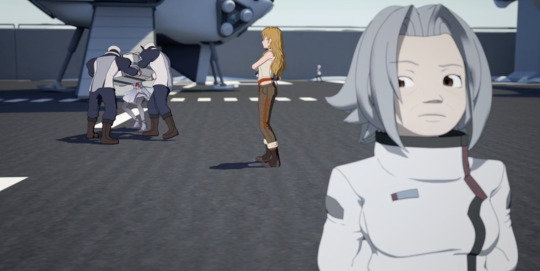
The answer to this problem? Have Adrian cry. Okay wait, how old is this kid? Because he looks to be about two. Maybe three. Regardless he is not old enough to cry on command, especially when his mom doesn’t, say, do something that she knows will upset him, but straight up goes, “Just like we practiced.” Oh yes. Over the last few hours you practiced with your toddler until he’s now an expert at crying at the drop of a hat. There’s a hint that this is his semblance—those rings of sound we see emanating outward—but that’s not confirmed (it could just be a stylistic choice to show he’s crying very loudly) and even if it was, that doesn’t change a kid’s ability to comprehend his mother’s vague statement and execute an order. RWBY is a show with fantasy qualities, but they’ve never extended that to human development before.
My point is this is stupid. And stupid is okay! On its own this scene is absolutely hilarious and if we’d gotten it a few episodes ago I would have been thrilled. The RWBY gang meets Jaune’s sister, her wife, and the proud parents show off their kid’s semblance by asking him to cry. Adorable! No one cares if the logic there is iffy because it’s just a fun, character driven moment. There’s nothing relying on that logic. Here though? It’s precisely what I’m trying to point out. In order for the plan to work the logic of the world has to suddenly bend itself to the kids’ whims—up until the plot wants them to fail.
That’s just annoying.

So Adrian cries and the guards are immediately distracted. “A crying child!” “We must console it!” Kudos to them for being kind people. They’re weird and way too wrapped up in the supposed superiority of Atlas, but there’s something to be said for seeing a kid crying and dropping everything to try and make him smile.
Weiss takes her own luggage onto the airship… where we hear Maria’s voice inside.
Look. Maria is small. She’s not that small. Is it possible to fit someone into a suitcase? Yeah. Pretty sure I’ve seen Youtube videos of stuff like that. Is it a good solution when applied to a problem that’s been plaguing your team for half a volume now? Not really. You’ll notice throughout this recap that all of the things I point out do have potential explanations—maybe Adrian is that smart, maybe Maria is that small—so it’s less an issue of each thing individually and more that they’re all slammed together in one episode, piling on each other to ensure that the plan works as much as it does. All writing requires a suspension of disbelief, but RWBY is really stretching theirs today.

Everyone else is standing by at various locations. Where did they get these comms to stay in contact? Who knows. Maybe Terra? We’re not told. Because there’s very little in this episode that’s meant to be taken seriously, despite the fact that it should be. RWBY is trying to work in a lot of humor before the finale’s inevitable angst, but this really wasn’t the time to do it.
We do see then that Terra is helping them by giving Blake and Yang info about the relay tower. I said before that they should use her as a resource, absolutely, but here we see them using her flippantly. Terra says seriously that this conversation “never happened” and Blake rolls her eyes at her. “Don’t worry. This isn’t the first time I’ve disabled Atlas security.” That’s not the point, Blake? The point is this woman—who you met two days ago, I might add—is risking her job in order to help you steal a freaking airship. Hell, she’s probably risking her freedom too. Cordovin is absolutely the type to chuck them all in jail in the name of “order.” Moments like these just re-emphasize to me how childish the group can be and once again the problem isn’t that childish view in and of itself, but that they’re not learning from it. That no one is calling them out on it. The story doesn’t challenge Blake on her insensitivity here, that she’s shrugging off this woman’s sacrifice like it’s her due. Of course you’d risk all this in the name of our idiotic plan. We’re the heroes. My leader just announced last night that we know what we’re doing and you all should follow along. Your worry is hilarious.

Terra reiterates that this conversation “never happened,” but we’re supposed to laugh at her fear. It’s not meant to read as legitimate because Blake isn’t worried and Blake is one of the protagonists. Now I want Terra to lose everything, just so the gang can look back on their choices and go, “Huh. Maybe we were hasty and kinda arrogant. People got hurt because of that.”
…Except we’ve already seen this. That’s the exact setup involving the relic and we still haven’t had anyone acknowledging how bad those choices were. At this point it’s not even a matter of whether you think the kids should or should not have found out about Salem, or challenged Ozpin’s authority. That ship has passed. It’s the way they went about getting the information that’s a problem. Entitlement, lack of empathy, thinking that it’s your way or the highway. We’re seeing more of that with this plan.

Then we get a legit wonderful moment though. God bless. Yang drops Blake off a little ways from the tower and asks if she’s sure she doesn’t want any help. Blake rightly points out that it’s a lot easier to sneak in with one person than two… and also, uh, sorry Yang. But you’re not exactly the stealth type.
This is a natural, well-written moment between two people who know each other intimately. My friends and I do this all the time: kinda insulting each other, we’re kinda annoyed by it, but we also realize the other has a point, so there’s no hard feelings. But I’m still gonna act a little like there is because it’s my right to fake-sulk in this moment. The expressions and dialogue are on point here. “I mean… you’re great! And I’ll hurry back!”


Highlight of the episode for me. Everything else can scoot on out.
We cut to an enthusiastic Jaune. “YES! Everything is going to plan.” Yeah, only because your plan has Plot Armor right now. We get a shot of Qrow leaning against a tree in the background, obviously unhappy. We’re once again suppose to sneer at his pessimistic attitude, but he’s right. The show isn’t commenting on his actual issues (drinking, lack of faith in general) because it’s too busy focusing on the one time Qrow is 100% on track this volume (this is a horrible plan bound to go awry).
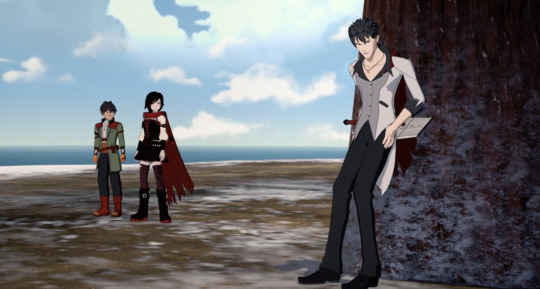
We return to Weiss on the airship where she watches her scroll until she’s finally out of range. We stay focused on her seat as the sounds of a fight happen off screen and then the twins are drifting down from the airship on a single parachute, held together by one of Weiss’ glyphs.
But then that breaks and one of the guys falls.
He catches hold of the other’s leg because—again—the writing wants this plan to have a strong comedic tone (no doubt to combat the coming drama of Yang and Blake fighting Adam) and is ensuring that nothing bad actually happens. But something bad could have happened. Quite easily. These guys don’t appear to be fighters. I doubt they have the aura to protect them from a fall like that. Weiss could have just killed a guy if the writing was willing to take this plan at all seriously.
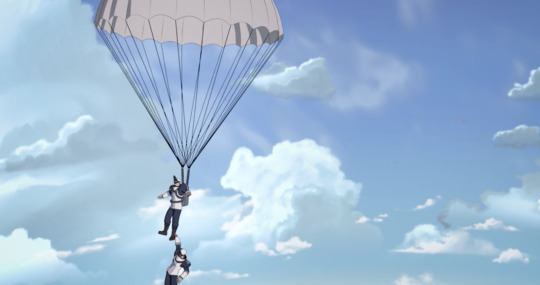
All we get though is a slightly guilty look from Weiss. I honestly find this whole series of events to be absurd. It would have fit in well with the early volumes of RWBY before the show grew darker and started emphasizing the consequences attached to a huntsmen’s choices; before we had a whole volume trying to convince us (unsuccessfully imo) that our group is made up of mature adults who are on par with—or according to Ruby’s words—surpassing the likes of Ozpin and Qrow. And this is how they follow up the claim that they don’t need and have never needed adults?
Ah yes. Stealing from allies, beating them up, and tossing them out of a plane. The epitome of being a huntsmen.
We then get the exact kind of line I figured was coming.
Maria: “Missy, I was the Grimm Reaper. What part of ‘best huntress of her generation’ don’t you understand?”

(In which that expression is me.)
Of course she can fly an airship! Note that the dialogue dodges all the concerns Weiss brings up. Aren’t you blind? Maria just laughs. Okay, okay, we as the audience at least got a glimpse from Maria’s perspective and know she can see shapes, but aren’t the goggles that allow you to do that “in desperate need of repair”? Maria still doesn’t provide an answer. She takes a super convenient plugin that just happens to fit the glasses we’ve only ever seen her wearing and we get a SENSORY DATA readout on the screen… so she’s connected to the ship now? Who knows. Again, we’re given no explanation. “Why would you kids let me fly this thing?” Maria asks, but it’s once again just another joke to laugh at, not treated as a legitimate question that I’d like answered. There’s a big difference between not boring your audience with every detail of how something works and outright ignoring how it works because you can’t be bothered to come up with something convincing.
Additionally, as said, the episode is riddled with more of that adults vs. kids mentality. Cordovin tells Weiss that, “Knowing you’re returning to Atlas just warms my old heart,” reminding us that the antagonist of this episode is old. She says, “It’s time you ask yourself, children: do you truly wish to defy me?” framing her, the adult, as the bad guy and the team, the “children,” as underdogs we’re meant to root for. Our episode title is “Stealing from the Elderly” because remember, we’re not just stealing from Atlas. We’re the young people stealing from old people because young people are good and old people are bad. Cordovin has been established as a delusional, nationalist, overly controlling racist. There are plenty of reasons to dislike her. Why does the show feel the need to emphasize age as one of the primary reasons we should distrust her? Oh yeah, because our protagonist just announced last week that kids rule and adults drool.
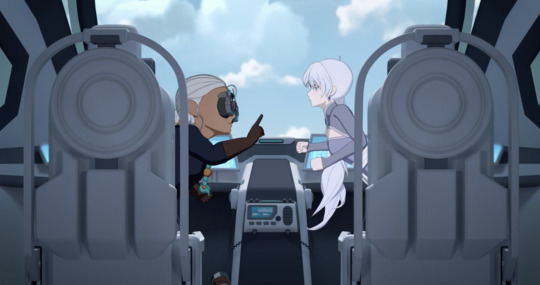
I bring this up again because it’s in direct contrast to what we’re seeing here with Maria. Her age is being used as a catch-all explanation. She’s ancient! She was a renowned huntress! That’s all you need to know. It’s because she’s been around so long and had so much experience that we supposedly buy into the fact that ‘fly an Atlesian airship’ is a part of that skill repertoire. We see the same thing happening when she conveniently knows the “jargon” to speak with the man down at the base. RWBY wants to have its cake and eat it too. Ozpin leads the team and keeps everyone going/alive. The kids turn on Ozpin because they don’t like how he runs things. Maria takes his place and does the exact same thing (giving orders, keeping them safe and their morale high), but the kids refuse to acknowledge this and the narrative encourages us to do the same. We never needed adults. Except now, once again, it’s an adult and an adult’s experience that’s coming to the rescue… but just forget about that by the time Ruby gives her speech to Qrow, okay?
You can’t have it both ways.
RWBY sure is trying though. While Maria perfectly flies her airship—and taunts Cordovin with cashews. That was admittedly great—things finally start going south. Blake was supposed to take out the tower but now isn’t responding to anyone’s calls. Cordovin hops into a giant fighter and demonstrates the ease with which she can knock Maria and Weiss out of the sky. Watch how fast the group goes from smug to panicked. Oscar yells, “What are we going to do?”—a familiar question at this point in the volume. Keep in mind that given Cordovin’s extreme personality, that first shot was (once again) only a warning shot because the show can’t actually have Weiss and Maria die a fiery death as their ship explodes in the sky. But that was always a possibility! Your actions have consequences. Often horrific ones, but like with the relic, no one is admitting that their ill thought choices are at the root of it all.
Qrow finally speaks up, but it’s not to let the kids take responsibility for their horrible plan that’s now put three teammates in danger. He shoulders all of it, claiming that it’s because of his semblance.

Which… okay. There’s a lot to unpack in this conversation. That is actually a very in-character thing for Qrow to say, but I’m still waiting for someone to point out how irrational his guilt is. That needs to be a part of his healing process, acknowledging his actual mistakes (relying on drink to the point where he becomes a liability) rather than stuff he’s not at all responsible for (this mission). Qrow’s semblance has a range. We established this clearly in his fight against Tyrian, so how the hell did he mess things up for Blake who’s all the way at the tower and Weiss who’s all the way up in the air? In that moment I thought Ruby would point this out. Start the conversation we should have gotten last week: Your semblance isn’t the problem and neither is the fact that you’re obviously hurting from these revelations. Your coping mechanism is. We need you to take responsibility for the things you can actually control.
Instead we get:
Ruby: “We’re all in this together and we’re all going to do the best we can. That’s all anyone can do…we would have come whether or not you let us so stop talking like we’re your responsibility. We’re not.”
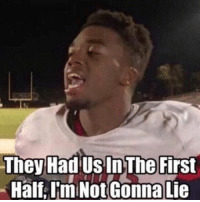
Ruby, I hate to break it to you, but you are Qrow’s responsibility. Four times over.
Emotionally as the much younger niece of an adult uncle.
Legally considering that you are a minor in the company of an adult.
Legally again given that Qrow has his huntsmen license and you do not. Right now he is the only one with any authority in the real world (presuming that Maria can’t prove her status as former Grimm Reaper).
Justly since Qrow has been fighting this war for at least a decade and you’ve known about its existence for about three months.

Even if you believe Ruby is a fully autonomous adult at 16 with no formal standing in this world, the knee jerk reaction of “we would have come whether or not you let us” is precisely the problem. This isn’t a matter of rejecting what Ruby sees as unwarranted authority, it’s a rejection of valuable support. Qrow did tell them not to do this, but he said as much because the plan is stupid, not because he’s an adult who wants to…what? Curb kids’ actions just because he can? His objection had nothing to do with his authority and everything to do with the fact that this plan can only end badly—as we see happening right this moment. By planting herself on Team Kid, Ruby is choosing to automatically reject adult voices not because the advice itself is bad, but because it came from them. Boiled down the message is teenage rebellion. Don’t tell me what to do… even though you’re usually telling me what to do for a damn good reason.
Remember though, the writing is pro-protagonist here. So instead of having Qrow point out that these views need to be addressed, we get,
Qrow: “How did you grow up so fast?”
Ruby: “I had good role models.”
Ruby is not grown here. She’s doing a damn good job for a traumatized teen thrown into an impossible situation, but just because she believes she’s the bees knees now (ha) doesn’t mean we as the audience need to buy into that. Kudos for acknowledging those role models… but jeez. Rather than a heartwarming moment between uncle and niece, this now reads very much as, “I had good role models and now I don’t need them anymore.” Ruby says they could use “Qrow Branwen,” but she’s not showing it. The last time we saw her speak to Qrow she was announcing that they didn’t need Oz or other adults. Based on what we’ve seen, rather than address the actual issue (alcoholism) Ruby is trying to put Qrow into a subordinate position. I want your help, but only if you follow our lead. I just reminded you that (I believe) you have no authority over me anymore and you can’t make us do anything. Your place here depends on you acknowledging that we don’t need you; we’ll just have you.
Which would be something to consider if these kids had actually demonstrated an ability to survive without adults and make better decisions than adults, as they claim they have. If they could actually think and act and plan and enact as equals, on par with people who have finished their schooling, experienced far more, and fought this war for decades (if not millennia). But RWBY hasn’t shown us that. As I’ve laid out elsewhere, the show has in fact done the exact opposite. We’ve had 6 volumes demonstrating why they’re not ready to call all the shots yet, emphasizing how much kids still have to learn. Whether it’s a matter of thinking ahead, thinking strategically, controlling your emotions, or a straight up difference between you and an adult fighter’s power, the kids consistently need an adult’s assistance. Which is natural! But it’s also why having the show frame Ruby as justified in this attitude is quite frustrating to watch.

But whatever. I’m trying to enjoy this episode despite all the issues I see, but I really prefer writing that hangs together and volume 6 has been all over the place. Regardless, we see more of Cordovin piloting that robot (at least she’s reliably over the top in her characterization), but we also see how everyone else is reacting to it.

Civilians are scared. They’re all staring, some holding onto one another, others with hands up over their mouths. This is why the plan is stupid. Not just because we need to crank up our suspension of disbelief, but because they’re stealing an airship. And now they’ve gotten caught. Again, the plot kept treating it as a joke, but Atlas is actually going to see them as “traitors” for this. It is going to cause more tension between the kingdoms. It’s already freaking people out.
Hmm. What happens again when people get anxious and scared...?
And now Ruby wants to start a battle. They’ve committed to this theft, which means that once things go badly all they can do is escalate the situation. They’re not going to surrender. They’re going to make things worse by now attacking the special-operative in charge of this base. It doesn’t matter how much of an asshole Cordovin is, she’s not an enemy. She’s not a grimm, a bandit, or a subordinate of Salem’s. She’s an authority figure of a currently tenuous ally… and Ruby’s solution is to call Weiss back so they can “take this thing down.” This is what happens when kids are in charge.

Qrow got in trouble for destroying two random Atlas robots. What do we think is going to happen after the gang destroys what looks like one of the best (and most expensive) defenses Argus has? Well, at this point presumably nothing since the writing is determined that the kids shouldn’t take responsibility for their actions, but logically it can’t end well.
Let me be clear here: they are in the wrong. It doesn’t matter that they’re our protagonists with a super secret mission. These kids stole the property of an ally in a time of peace, endangered lives, planned to disable their security, and now plan to destroy one of their primary defenses. Their actions are scaring people which means they’re more likely to attract grimm. The show can dress it up if they want, but the gang’s plan goes against everything they’re supposed to be striving for as huntsmen.
Regardless, they’re going through with it. We end the episode with the surprise reveal of Adam, another ‘Okay how does this work?’ moment. So he really was there on the train and out by the farm? He just left Menagerie after getting there and managed to catch the same ride? Following them without anyone noticing? Waiting for this precise moment to get Blake alone? Fine. Sure. If I can ignore the gang getting to Argus in an afternoon I can ignore this too.

Especially because I am looking forward to Blake and Yang finally getting to confront him, if only so we can (hopefully) put Adam’s arc behind us. I’ve never been invested in him as a villain, primarily because he doesn’t do anything. His status as a Bad Guy is so tied up with Blake that unless they’re on screen together Adam is just a whiny, useless man-baby. RT does his abuse very well—his claim that Blake “ruined everything” and her calling him out on his “stalking” were great—but those interactions are rare for obvious reasons. So yeah, I’m hoping for a semi-accidental death in this fight. I don’t want the girls to go through the trauma of being murderers, but if Adam could do something stupid that results in him being killed? I think that’d be good. Let the girls find their closure and then be done with him. The cast is massive. We don’t need to keep around characters who only manage to be relevant once every two volumes.
Maybe he can hit a part of the tower and electrocute himself. Would that kill a fighter other than Nora? I don’t know… and now that I think about it, this theorizing is getting morbid lol. Let’s just wait and see.
Until next time!
Other Things of Note
Cordovin’s comment that everyone was devastated when Weiss chose Beacon over Atlas is a great contrast to the comment about Pyrrha. Both went to Beacon to escape the attention from their home towns, but one was a good attention that just proved limiting—are these people really my friends?—while the other was outright abuse.
Honestly, “Jargon was fine, but our pilots aren’t elderly women” is one of the few parts of this plan that’s logically on point. Yes. It is highly suspicious if the pilot checking in sounds like Maria. So it’s clear that RT can apply these basic rules when they choose to.
“That’s the sound of me not caring!” Istg cute bees teasing and Maria living her messed up life to the fullest saved my sanity today. I’m staning those parts of this episode.
How does Adam see??
90 notes
·
View notes
Text
Abuse is Complicated
I’m writing this after having read Moses Farrow’s article.
What I’m about to say might cause offence (especially if interpreted unfavourably), or else it might seem ill-intended or unsavoury in some way. It strikes me that on its own, none of these is ever a good reason to shut up.
All I can do is insist that my aim is broadly to help rather than harm, regardless of how clearly and carefully I manage to express what I mean. For what it’s worth, I’ve tentatively concluded that my view here isn’t being obscured by any privileged blindspots, at least to the best of my ability (given the optical disabilities potentially conferred by said blindspots). And perhaps most importantly, I’m willing to listen to contrary views and I’m open to changing my mind.
After writing the above disclaimer, I must say that the forthcoming post doesn’t feel quite as controversial as it did initially. I dunno, maybe it is. In any case, the subject of abuse is certainly (and rightfully) a sensitive one.
Whatever the status of Moses Farrow’s article in relation to the accusations about Woody Allen, when it’s considered in wholly abstract terms I think it’s an important contribution to the conversation about abuse. It speaks to the care and critical thinking with which claims of abuse and abusive situations ought to be treated.
This reminder is two-fold and bidirectional. First, it should remind us to be wary of confirmation bias. E.g. we should be careful not to believe Moses Farrow’s version of events primarily because we want to enjoy Woody Allen’s films without guilt. Such motivations are often tacit and easy to deny (or to repress, for that matter).
Second, and from the opposite direction, it should also remind us of just how complicated abusive situations often are. Generally-speaking, it’s too easy and self-serving to immediately jump into firmly advocating for x, where x is the simplest story that initially rings true for us, or fits with our anecdotal experiences or sociopolitical agendas.
In particular, one complication that the article raises (whether or not it’s relevant to the specific case of Mia Farrow vs Woody Allen) is the following rather counterintuitive fact:
falsely accusing others of abuse is a prominent characteristic of abusive people.
Needless to say, this fact alone serves to massively complicate outsider interpretations of abuse claims, even though the informal benefit of the doubt should probably lie with accusers rather than the accused, for broadly pragmatic reasons (and contrary to the legal presumption of innocence, which itself exists for broadly pragmatic reasons). Of course, it’s also the case that truly accusing others of abuse is, by logical necessity, a characteristic of targets of abuse or people speaking on their behalf. However, unlike the above, this fact is hardly a counter-intuitive one.
Given that making false accusations of abuse is a prominent characteristic of abusers, why is it somewhat counterintuitive? In part, I suspect it’s counterintuitive just because it implies that in many cases of alleged abuse, appearances are not merely deceiving but exactly the reverse of what is true (or, to be more accurate, the negation or contradiction of the truth). Such pills are always going to be hard to swallow. Separately, I suspect it’s counterintuitive partly because we’re falling prey to something that usually serves us well—namely, our empathy—and that our empathy is letting us down in two different ways.
First, I suspect that our empathy is letting us down because it makes it hard for us to imagine that some people are wired very differently from ourselves. Automatically, we tend to try to explain other people’s behaviour by using ourselves as a model, and projecting onto other people our own most likely reasons for the relevant behaviour. Because of this, it can strike us as the height of implausibility that someone would make a false claim of abuse, merely because there are very few possible contexts in which we imagine that we (or people relevantly like us) would have a compelling motivation for doing so. (Why would they lie? It’s too risky! Why would they risk the humiliation, invasions of privacy, victim-blaming, character assassinations, and negative attention unless they were telling the truth?!)
Let’s put aside the fact that there are people who are psychotic to varying degrees, and therefore might firmly and inflexibly believe things for which they have absolutely no evidence. Even so, there‘s a substantial chunk of the population (approximately 10 in every 100 people) who not only lie frequently, but also have pathological motivations for lying that would seem bizarre to a person who was relevantly psychologically healthy, and would be difficult for such a person to comprehend.
Indeed, this is a large part of the reason that making false accusations of abuse is a prominent characteristic of abusive people in the first place. Broadly-speaking, lying to get what you want, and compulsively shifting the blame at any cost, are themselves abusive behaviours. The personality disorders that dispose people to abusive behaviours also dispose them, inter alia, to impulsive risk-taking, psychological projection, lying, confabulating, creating drama for it’s own sake, seeking attention (sometimes even if it’s negative), and compulsive blame-shifting. Thus, in effect, such disorders dispose people to making false accusations of abuse, in circumstances in which no healthy person would have any motivation to do so, and even in circumstances in which doing so would be not just risky but inevitably self-destructive. If you don’t suffer from one of these personality disorders then unfortunately (or perhaps fortunately) you have very little hope of grasping the mindset and motivations of such a person. In lieu of this intuitive understanding, you simply have to take into account, as a brute fact, that approximately 10% of people (and probably slightly more) can have pathological motivations for falsely accusing others; motivations that would seem bizarre or prohibitively counter-productive to you.
In effect, when it strikes you as implausible that a particular accuser would be lying, it does so only because of your tacit assumption that the accuser is unlikely to be pathologically abusive. However, this assumption could easily come from the fact that you’re also tacitly assuming the wrong reference class—namely, the general population. A random member of the general population is rather unlikely to be pathologically abusive (since this is only true of roughly 10% of that population). However, the general population isn’t the correct reference class. The correct reference class is the population of people who’ve made accusations of abuse (whether true or false). To oversimplify slightly, a member of the general population will have made an accusation of abuse if and only if she either has been a genuine target of abuse, is a spokeperson thereof, or is actually a pathological abuser herself. Overall, this makes up a relatively small percentage of the general population. However, since making accusations of abuse is a prominent characteristic of pathological abusers, pathological abusers make up a sizeable proportion of those who’ve made accusations of abuse (whether true or false). In other words, pathologically abusive people are drastically over-represented within the correct reference class (the population of people who’ve made accusations of abuse, whether they be true or false). Accordingly, while it might seem implausible that a particular accuser would be lying for pathological reasons, it also follows from the mere fact of the accusation that the likelihood of such pathology is actually relatively high; indeed much higher than one might intuitively expect. By extension, one ought to expect the likelihood of an accusation’s falsehood to be much higher than one would expect on the basis of intuition (assuming that the relevant intuitions arise from familiarity with the general population, tacit beliefs about the average person, or tacit beliefs about people who’ve been selected completely at random).
The second way in which I suspect that our empathy is letting us down is far more straightforward. Simply put, we’re more likely to believe and want to comfort and defend those who are presenting to us as victims of abuse, and more likely to want to disbelieve, condemn, and punish those who are presenting to us as perpetrators of abuse. Generally-speaking, of course, these are good inclinations to have. However, it’s important to remember that abusers are good at exploiting those very inclinations for their own benefit. Indeed, this speaks to many of the reasons that abusive people make false accusations in the first place—namely, to garner sympathy, save face, avoid responsibility, get attention (even if it’s negative), shift the blame onto others, devalue and discredit others, punish others, force others to remain in their lives (rather paradoxically), and so on. Indeed, in genuinely abusive situations, it’s terrifyingly common that the real abuser appears to be a sympathetic victim, while the real victim appears to be an unhinged aggressor or crazy person (usually the result, in part, of trauma from having been abused).
I should reiterate, at this point, that I‘m not intending to suggest that Mia Farrow’s accusations about Woody Allen are false or pathological; nor am I intending to challenge the informal social practice of erring on the side of accusers rather than the accused, when it comes to the benefit of the doubt. It’s just that if Moses Farrow’s article is true, then it would seem to imply that Mia Farrow’s false accusations are indeed pathological in the relevant way. And, as is typical of such cases, it would seem that the personality disturbances from which the false accusations arose would have originated with Mia Farrow’s own traumatic experiences as a target of abuse. In this way, Moses Farrow’s article raises the issues that I’ve discussed whether or not it happens to be completely true.
Regardless of what you might tell yourself, you’re not siding with or protecting victims of abuse by ignoring complications of this kind, in order to settle for a simplistic narrative that just so happens to support your existing prejudices or accord with your confirmation bias. Instead, you’re actually providing aid and protection to abusers—specifically, those abusers who are counting on the fact that you’ll ignore the possibility of their own abusiveness, while they set about destroying other people’s lives. Abusers can only count on this because the possibility of their own abusiveness is not always immediately obvious, because this possibility complicates matters (and we prefer our matters to be easily digestible and outrageous, rather than indefinitely uncertain and emotionally confusing), and perhaps because they know that we’re wary of contributing to the very real problem of victim-blaming and invalidation, which genuine targets of abuse so frequently face.
I guess what I’m saying is that these things are pretty complicated, and we should always be wary of a simple and emotionally-resonant explanation, whether it resonates with us because it soothes us or because it horrifies us. In fact, it’s precisely when things are at their most emotional and confusing and distressing that our hard-won critical faculties are most important. It’s when we’re feeling a powerful emotional push towards believing something, or when things just seem self-evidently one particular extreme way, that we should be most careful to engage in self-questioning and scientific reasoning, and to recall what we know about our own cognitive biases and misleading intuitions.
There are good pragmatic reasons for resolving to err on the side of accusers, rather than on the side of the accused. But in light of Moses Farrow’s article, one is forced to ask: which of the accusers, exactly? By themselves, surely all of the following are relatively bad answers to this question: ‘the one who first made an accusation’, ‘the one who made the first accusation that I heard’, ‘the one whose accusation, if true, makes me feel better about watching certain films’, ‘the one who’s accusation fits with the kinds of abuse with which I’m most familiar, or fits with my uninformed preconceptions about what is likely or plausible’, ‘the one whose accusation pertains specifically to sexual abuse’, ‘the one whose accusation pertains specifically to the abuse of children’, ‘the one whose accusation would most horrify me if true’, ‘the one whose accusation pertains specifically to the abuse of someone of gender A by someone of gender B’, ‘the accuser who is gender A rather than gender B’, etc.
I admit that prior to reading Moses Farrow’s article, I erred on the side of believing that Woody Allen must have done something abusive. I’m sure that this belief involved some countervailing of the potential for confirmation bias, since I do like Allen’s early films. I’m also sure that the appearance of Allen’s guilt wasn’t helped by the social oddness of the relationship between Soon-Yi and himself, along with the very real potential for exploitation or an asymmetry of power there. Also, you know, it’s tempting to think that where there’s smoke there must be fire (a belief that’s justified roughly in proportion to the number of independent scientific verifications of smoke, together with the average amount of smoke thus verified). Also, if Allen did even some of the alleged stuff, then that would be really bad. And so on. Of course, by itself, none of these is a particularly good reason.
I’m not sure where I stand now, after having read Moses Farrow’s article. Many of the details seem convincing to me. But who the fuck knows (apart from the people who are directly involved). And I guess that’s the overall point, as unsettling and unsatisfying as it might be.
Regardless of how one should err pragmatically, perhaps the surest belief that one can form, upon hearing a claim of abuse, is that some instance of abuse has almost certainly taken place, even if it’s not the particular instance that’s asserted by the claim.
1 note
·
View note
Text
A fear of failure is a fear of participation
Hiiiiii
The last few days in my head have been quite muddled.
So naturally, I decided to write.
Now, it would be easy for me to blame current circumstances, you’re probably reading this thinking, ‘Emily, we are in a the middle of global pandemic which has more twisting rules and misery than the LegoShop has bricks. Go easy’
A few years ago, I would've agreed with you and simply passed off my funny, fuzzy feelings as a product of my environment. Simply because, I didn’t use to enjoy being introspective or taking any accountability for my own attitudes or emotions. Actually, I loathed and avoided it at all costs.
For many years, I didn’t understand the concept of personal growth, it also seemed ludicrous to me that I would bother with something unless I had something better to show for my efforts.
Add to this, growing up, I didn’t for a moment, deem myself worthy enough to even improve upon, physically or psychologically, because In my head, it was always somebody else’s fault or problem if I felt sub-par.
Personal growth was an alien concept because I didn't value myself enough to want to grow alone, instead I encouraged the hopes that others would pick up this slack for me, as they did with many other things in life.
The idea of looking within, let alone fixing (or temporarily addressing) any misguided thoughts or ideas I had, seemed pointless and pitiful.
The paradox begins.
Upon realising that you view yourself without any flaws, yet, with far too many to begin uncovering and reforming, no surprises, naively, I felt it was easier to become ignorant to the whole idea of mental improvement.
I identify my past mindset as this: laziness frightened and fighting against a looming victim complex.
Oh, did I mention negativity?
I didn’t want to point any fingers at myself because I didn't want to take responsibility for myself or dedicate ANY of my time or effort to any growth I found which I needed.
I was scared to realise that my fear of failure (which is something I have always struggled with) was self induced and intensified by my own insecurity. The fear becomes deeper when you realise that your own mindset and thoughts are the only thing causing your stalemate.
I was once told: ‘you have more a problem with your disability than anyone else, Emily’ - never have truer words been spoken and they have stayed with me ever since.
Self sabotage is an incredibly difficult notion to recognise, but self awareness is a commendable and positive commitment that can help you work towards becoming your biggest champion.
By no means, do you have to be the best, instead, you just have to allow yourself to understand that you are worthy and capable of feeling and becoming so, if the chance arises for you.
In short, you are worthy of great things and feelings from daunting situations. Allow yourself to be scared yet successful.
Yes, I may ALWAYS be my own biggest critic, and there will certainly be times where I fall short, but I will no longer limit or disallow myself from pushing through resistance, (be these mental or emotional), No matter how scary or raw.
My fear of failure this week, very nearly stopped me from accepting and embracing a new opportunity entirely.
At the time, all I could focus on was: ‘what if I’m not good enough?’ ‘what if I can't do it at all?’ ‘I don’t want to make a fool of myself’ - when really, I should've taken a breather, appreciated the chance to learn (at the very least), and instead, been ecstatically hungry for this chance to succeed.
Again, my unfortunate mindset of negativity, laziness and fear, reared its head, while my victim complex popped in too, when I (wrongly) focused on the fact that, with this opportunity, arose the certain hard work that I would have to undertake too.
“Boo hoo Emily, you’ve been offered a great shot here, but, how we all pity you because it might get difficult. Poor thing!”
Yeah right.
After a day of intense thinking and not thinking at all. I came to this conclusion:
Nothing worth achieving is easy or simple. If it were, it would be labelled attainable not achievable.
To surrender, when you feel as though times get tough is simply, to remain, stop dead and stay still.
Flatlining is never advisable.
If you decide to pass by a chance, job or life experience because you feel it’s too tough, okay, you may not feel tough enough, but as harsh as it is, you’ll never get tougher if you refuse to fight
Don’t choose the comfortable nature of your reality ONLY because you don't ever wish to ever feel uncomfortable again.
This easy option is easy initially, but stagnating and suffocating overall.
After all, challenges are called challenges for a reason.
To try and fail, is above all else to show that you are open to participation.
You are learning and you are growing all because
you are still trying.
Comfort is confinement.
- Love, Emily Nicole
0 notes
Text
Defending patients
I’ve found that defending patients is in some ways uniquely challenging and in others uniquely easy, compared with defending other marginalized groups.
We benefit from the fact that anybody can become a patient at any time. It is much easier to get through to someone when you remind them that they could and probably will, eventually, be in your shoes someday. Most people also have someone in their life, at the very least a grandparent, who has received extensive medical care, which humanizes the issue for them.
We benefit from the fact that, for the most part, people don’t consider us to be in some way morally deficient. Almost everyone understands intrinsically that anyone can get cancer and that it doesn’t indicate a character flaw, and that cancer isn’t something that people choose to get. This is in contrast to homophobes, for example, who usually won’t concede that gay people didn’t choose to be gay, or that there isn’t anything inherently wrong with being gay. Gay people are just repugnant to them in a way that cancer patients aren’t.
(Where this breaks down often is when it comes to conditions that are affected by lifestyle. I have a hard time convincing people that, for example, overweight people and smokers still deserve healthcare. Crohn’s can fall in a gray area sometimes. Often people are convinced that because it’s a digestive condition it must have been caused by a bad diet. People who think this way are hard to reason with. People also have a hard time with mental healthcare, since some people think mental illnesses ought to be defeated through sheer force of will, as if the brain weren’t simply another organ of the body.)
We have a unique struggle though in that we don’t simply need to be left alone or given equal rights. When defending many minority groups we’re often just asking people to not go out of their way to be dicks, since somebody else’s gay relationship, for example, doesn’t affect John Q. Public’s life in any meaningful way. Before gay marriage was legalized across the US, arguing for that was a matter of asking that gay people be given the same rights everyone else already enjoyed. That feels like a pretty uncontroversially reasonable demand (though you wouldn’t know it from the fight put up by so many).
The struggle for patients is that we do require a sacrifice from people. In arguing for universal healthcare, I am asking you to consider my life and the lives of other sick people valuable enough to warrant raising your taxes. And most people just don’t care about people they don’t know, and it’s halfway impossible to convince them that they should. In this sense, your debate partners will often not be bigots exactly, but fiscal conservatives or libertarians. The argument becomes very different, and in many ways harder. Many of your friends who you never thought of as bigots, you will find, hold opinions about fiscal policy that would kill you if enacted, and yet they don’t consider this to be personal or offensive or hateful. This can be hard to reconcile. I try not to take it personally, but it’s hard.
It’s a more indirect sort of attack. Nobody’s threatening to kill us with their own hands, they’re just threatening to take their money out of the system and allow nature to take its course, allow our broken bodies to destroy themselves. I firmly believe this is a form of violence as real as more direct violence, but it can be hard to convince others of this. Knowing that your life is dependent on the money of people who don’t want to give money to you is a very vulnerable feeling. Until you’ve felt that vulnerability, you might not understand what we go through.
The best thing we can do, I find, is to be our own genuine selves in whatever communities we’re a part of (including internet communities!). The more opportunities someone has to meet and interact with an awesome disabled person, the more likely they’re going to feel like our lives are worth spending their money on. That beats logical argument most of the time.
(I hope this doesn’t come across as a battle for “which minority has it the worst,” which is not my intention. I spend a lot of time having internet arguments, and when I shifted my sights to advocating for patients, it struck me how so many of the arguments I had used in past debates didn’t apply to this one. I had to come to understand the mindset of a completely different sort of debating adversary. I just wanted to share my thoughts on this.)
1 note
·
View note
Text
Are You At A Learning Organization?
Learning is a significant part of any individual or organization. As Peter Senge puts it, one-third of the Fortune 500 companies will disappear if they fail to learn. Corporates have been running on traditional hierarchy for years but that doesn’t always facilitate learning. To create a learning organization, we have to harness Senge’s 5 principles and that in return can help us innovate for an impact.
Building a Learning Organization
Most innovative teams have a shared vision. They look forward to the same thing and work hard to ensure that every action or decision they take, brings them closer to achieving that vision. While they work for the vision, system thinking plays a very important role. You cannot focus on the big picture of you are distracted by smaller issues. Similarly, systems thinking approach focuses on the entire system. Leaders need to understand that every decision or action correlates to some other action. Events should not be approached individually but tackled as a series of multiple occurrences in a defined structure. Leaders should also effectively communicate the vision, the values and the business model of the company.
A clear understanding of the company’s business model and values helps employees make the right decisions. To innovate, you have to focus on important things that are right for your company’s growth and objectives. It is also essential that these values stay with them all throughout their tenure. Here the Mental Models come into play, where employees focus on the value and model of the company and have specific way of thinking. While the vison, values and the bigger picture matters a lot, the success of a team also depends on its members. Members should communicate clearly, help each other in tasks, create a healthy environment and learn as team. Learning to do things as a team goes a long way in innovating. Team members should believe in their individual competencies and train their minds to handle stressful and complex situations with composure. Growing yourself individually and creating a stress-free learning environment, pushes the rate of innovation.
Put it all together and we create an organization that innovates for a purpose. They don’t make something because it is cool, they do it because it is best for their organization and its customers. Purposeful innovation is a result of great team dynamics, leadership and clearly defined goals and vision. That makes it happen.
It Stems From Experience
I would like to share my experience from a company I previously worked with as an advisor. This is about its CEO and how he displayed two of the learning of the outlined by Senge. The CEO of the company always mentioned this statement, “I am the CEO of this company!” which closely resembles Senge’s description of “I am my position.” In his early days, I used to tell him that “No good leader ever asserts his title” but he was under the delusion that his position gave him dominion over his employees. He didn’t see himself as a leader but a ruler of sorts.
The ruling attitude strikes fear but doesn’t last. He could impose this attitude for a while but then started experiencing insubordination and drop in productivity. His team started growing tired of him and acted haphazardly. This was not the end of it. He was under the impression that he could fix this by shouting even louder. He couldn’t see that he was merely reacting to the problem (in a poor way) and not fixing it. This is what Senge calls “the illusion of taking charge.” He was a boss with poor reactions and even poor team management skill. Insubordination was followed by brain drain in the company whereas dropped productivity saw lay-offs as a consequence. These things weren’t good for the company.
The company stopped innovating, charts started falling and the board noticed this. Furthermore, a classic board room dance began. The board was divided on whose fault it was but eventually concluded that there was a major flaw in the leadership. The CEO was given a quarter to fix himself and his team but the same old reactive tendencies and ruling attitude ruined the company more. What was then clear to the board was that, he had to be ousted and so that happened. Being one of the members who voted for his ousting, I believe his attitude was toxic and would have led a multi-million-dollar company to insolvency. The company did flourish under a new leadership.
Takeaway
What we learn here is that, a learning disability on the top can potentially destroy the whole company. The world has seen various such examples and still hasn’t learnt enough from it. It takes more than a position and a mere reaction to be a leader. You need to fix your mindset first then lead a team – irrelevant of its hierarchal position. I see these two disabilities as major negative disruptors for any organization. You just cannot move ahead like this.
The post Are You At A Learning Organization? appeared first on Shreyash Mishra's Blog.
0 notes
Text
On the transgender crisis
I find it ironic that the UAMS offers this but University of Arkansas insurance does not cover any form of gender dysphoria.
From the web
In response to the May 11 cover story, "The real transgender crisis in Arkansas: health care," on the gender clinic at the University of Arkansas for Medical Sciences:
This is an excellent article. I find it ironic that the UAMS offers this but University of Arkansas insurance does not cover any form of gender dysphoria.
Teri Dawn Wright
I do not have an original birth certificate. I was adopted 47 years ago from South Korea. I was found and put in an orphanage. This is typical of most people adopted around that time. If I were trans, then I would have been figuratively screwed up the butt by the conservatives in our legislature.
SouthMeetsSouth
In reponse to the May 11 reporter, "The biking news," about a grant to design a bike trail from Little Rock to Hot Springs:
This is an exciting project for cyclists. I would also like to see a study on the feasibility of a commuting bike path along I-630. There are already pieces, i.e., a path from John Barrow Road to Rodney Parham and a path in the median of Chenal. If we want to encourage bike commuting, this would be a more convenient (although less scenic) route than the River Trail and more accessible to biking from home for many in West Little Rock.
Tomato Dave
In response to the Arkansas Blog posting of the video of a man in a "Make America Great Again" cap raising hell on a United Flight from Shanghai and getting booted off the plane:
If you ever doubt that President Trump's rhetoric and the whole MAGA mystique is about anything other than ensuring that white males maintain their supremacy, all you have to do is watch this video.
AnnaHarrisonTerry
I am ENTITLED to that seat.
Unfortunately there are way too many people in this country — Arkansas has more than its fair share — who will defend this asshat's entitlement.
Vanessa
In response to Arkansas Blog posts on President Trump's proposed budget cuts of $1.7 trillion that would reduce food stamps, health care accessibility, Social Security disability benefits and more:
Well, when Arkansas Trumpers turn into whiny little bitches because Trump's budget and other bad stuff are hurting their families, MAYBE THEY'LL WAKE the FU!!
They are 100 percent not changing their view that Trump the faux billionaire cares for them. Why, every deal he's made is for them ... unless you read 5 minutes and find out Trump's deals are for himself and the rest of the super 1 percent. If Trump stays in the White House/Mar-a-lago for two more weeks or two more years, three-fourths of his time will be spent enriching his family and that other fourth will go to enriching fellow 1 percenters. Do the math: none for us.
No time will be spent on the rest of us no matter how we voted or how red our state is. He's not in office to work for the 99 percent, just to feed 'em bullshit at an amazing rate and giggle when he sees they're taking the bait. It's sad, not Trump sad, but the real sad, hard sad, human sad ahead of us.
Deathbyinches
Hey MAGA-hatters, Drumpf's proposed budget will:
Gut your health-care, MAGA-hatter: Seth Rich!
Impose deep cuts on Medicare, MAGA-hatter: Clinton Foundation!
Allow states to limit Medicaid enrollment, MAGA-hatter: Private email server!
Cut food stamps to over 40 million people, MAGA-hatter: Sandy Hook fake!
Cut meals on wheels for impoverished, shut-in elderly: Birth certificate!
Roll-back student loan protections, MAGA-hatter: CNN fake news!
Slash public health funding and infectious disease research, MAGA-hatter: Gun grabbers!
Boost an already bloated "defense" budget, MAGA-hatter: Mur-ica First!
tsallenarng
The sky is falling, the sky is falling.
When are y'all going to start dealing in fact? Not false news. Not maybe. Solid verifiable facts.
What bullshit.
Razorblade
Keep lying to us, Razor. It helps us verify where you keep your head and it helps us understand the denier's mindset. Even a bad example serves as a lesson to us all. And, by the way, do you need an extra jar of Vaseline?
Jake da Snake
In response to an Arkansas Blog post about Sen. Tom Cotton's appearances in Iowa and his denial he's not running for president in 2020:
It is grounds for despair among thinking folks that someone like Cotton can be taken seriously as a potential presidential candidate, three years out. Of course, if he's running now, that means he doesn't think that he'll be running against Trump or Pence.
The real grounds for despair are not Cotton, nor Trump, nor Pence, but that a substantial plurality of the American electorate still approve of them. We don't need a voter ID law, we need a voter IQ law.
It is now time for my only religious ritual, thanking whatever gods that be for the invention of Scotch.
Silverback66
On the transgender crisis
0 notes